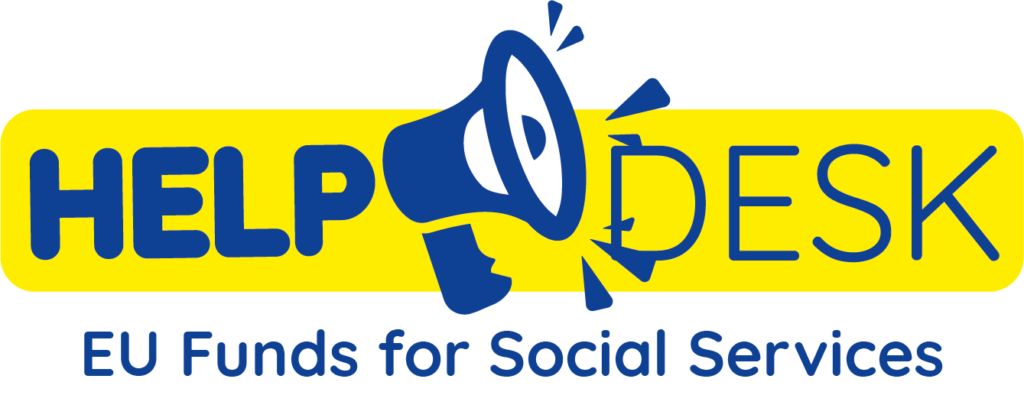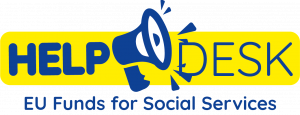On 16th April the partners of the HELPDESK project hosted over 90 participants from across Europe in Brussels to share the project’s tools that will help to unlock EU funds for social services. These tools are available to Managing Authorities, social service providers and Intermediate Bodies to facilitate access to and simplify the use of EU funds for Social Services. Resources include a Facilitation Toolkit for Social Services Projects for Managing Authorities to help social services effectively respond to the administrative and technical challenges of applying for and using EU funds. The project has also produced an e-training for social services on how to successfully fund their EU projects.
In the current EU funding period 2021-2027, the European Social Fund Plus (ESF+) has a total budget of €100 billion. Of this, 25% is earmarked for social inclusion projects. These funds have great potential to support and invest in quality services and support, thereby investing in improving lives. However, there is clear evidence that suggests that these funds are not being used effectively and social care and support services as well as local authorities report multiple difficulties in accessing EU funds. Key barriers to the use of these funds by social services include the large bureaucratic and administrative burden of handling EU-funded projects and a lack of knowledge among social services on how to get access to EU funds. Stakeholders also report that rigid and narrow project calls reduce the potential for EU funds to be used for innovative support and social care service delivery. Furthermore, Managing Authorities face challenges in defining, measuring, and monitoring the social impact of such projects.
Within this context, the HELPDESK (Social sErviceS helpdesk on EU Funds) project was launched in May 2022. Co-funded by the European Union, the project has aimed to raise awareness about ESF+, the European Regional Development Fund (ERDF) and other relevant EU funds, and how such funds can better support quality social services. The project has also facilitated access to and simplified the use of EU funds for social services. It has also promoted exchange and cooperation between key partners to ensure that funding priorities are based on an assessment of social needs and target effective evidence-based social services interventions.
The project has brought together the experiences of a cross-European collaboration of 16 partners consisting of EU NGOs spanning nearly all social sectors and national stakeholders from 5 countries (Spain, Italy, Sweden, Belgian, Czech Republic). Over the last two years, the project has developed several key tools to support Managing Authorities, Intermediate Bodies and social service providers to access and effectively use EU funds. These tools include:
- A Cross-country Report on the needs, opportunities, and challenges related to the use of ESF+ and ERDF funds by social services.
- Country Fact sheets to help social services better understand the functioning of ESF+ and ERDF in each EU Member State and provide relevant contacts and information sources to access EU funds.
- A Facilitation Toolkit for Social Services Projects to help Managing Authorities streamline the project management process and help services effectively respond to the administrative and technical challenges encountered at every stage of the project cycle in 10 languages. This tool can also be used by social service providers in their advocacy work toward Managing Authorities.
- An e-training for Social Services, available in 6 languages, on how to successfully fund their EU projects from the start of the call process to beyond the final reporting period.
- Policy Guidance for Managing Authorities, the European Commission and social service providers with recommendations and practical steps on how to improve access to EU Funds in 10 European languages.
- Booklet of inspiring practices with examples of how social services have accessed and implemented EU-funded projects for innovative forms of support in 10 languages.
On 16th April the partnership hosted its closing conference in Brussels. The event was opened by European Commissioner for Jobs and Social Rights, Nicolas Schmit. Speaking via video, Commissioner Schmitt stressed the importance of social services in society to deliver vital support to citizens and highlighted the need to ensure that EU funding can be accessed by the entities that can provide such support. Commissioner Schmit praised the HELPDESK project for its remarkable work to help social services navigate the funding landscape, particularly its Facilitation Toolkit which could help to alleviate the administrative burden of ESF+ applications and implementation.
Commenting on the outcomes of the project, Freddy Jussien, EASPD Project and Policy Officer and Co-coordinator of the project, said “This Helpdesk offers concrete solutions to build an enabling environment for the use of EU funds by social services to foster social inclusion. In particular, HELPDESK’s e-training is a key tool that can help to build the capacity of social service staff to successfully apply for and implement projects with ESF+ funds.”
Mathias Maucher, SSE Policy and Project Coordinator, said “With its bridge-building function between Managing Authorities, Intermediary Bodies and social service providers, the use of the main project deliverables beyond the duration of the project and the synergies established in many EU Member States in the last two years can help to complement the work done by the Communities of Practices “Social Inclusion”, “Social Innovation” and “Employment, Education and “Skills”. This is also a learning relevant for any follow-up activity and an insight acknowledged by representatives of these Community of Practices before and during the event. In this context we hope that the Policy Guidance and Recommendations elaborated and coordinated by SSE – with a lot of valuable input by many key EU-level and national stakeholders working in different fields of social care and support, affordable and social housing and migration will be a good tool and a source of inspiration in order to use the ESF+ in order to promote person-centered, user-oriented, rights-based and community-based social services which can effectively improve the qualify of life, the wellbeing and the social and human rights of their users” .
Closing the HELPDESK event Lilith Alink, EASPD Policy and Project Officer and Co-coordinator of the project; concluded, “EU funds have the potential to encourage Member States to go one step further, to not only invest in upholding the status quo, but to pilot new services, and invest in innovative social support and community-based and person-centred approaches, which improves the lives of the people who rely on such services. The HELPDESK tools can help local stakeholders, including social services, better access these EU funds and make this transition.”
Closing the Helpdesk event, Mathieu De Poorter, President of the European council of associations of general interest (CEDAG) and partner in the project, reaffirmed the ambition of the partnership to pursue the work saying, “The partnership will not rest (to pick up the words of Jeroen Jutte, Head of unit at the European Commission), and we will continue our efforts to make the best use of all EU funds for driving forward a social and inclusive Europe and deliver on the European Pillar of Social Rights to ensure a green and fair sustainable transition”.
Moving forward, the 16 project partners have committed to supporting the sustainability of the Helpdesk to optimise the use of EU funds for social inclusion and called on the European Commission to do the same.
Supporting Documents:
- HELPDESK Website available in all EU languages
- HELPDESK Facilitation Toolkit for Social Services Projects,available in English, French, Spanish, Italian, Swedish, Czech, Bulgarian, Slovak, Greek and German.
- HELPDESK E-Training for Social Services, available in English, Czech, Swedish, French, Italian and Spanish
- HELPDESK Policy and Technical Guidance for Managing Authorities, social services and the European Commission, available in English, French, Spanish, Italian, Swedish, Czech, Bulgarian, Slovak, Greek and German.
- HELPDESK booklet of inspiring practices on the access to and the use of EU Funds for social services, available in English, French, Spanish, Italian, Swedish, Czech, Bulgarian, Slovak, Greek and German.



